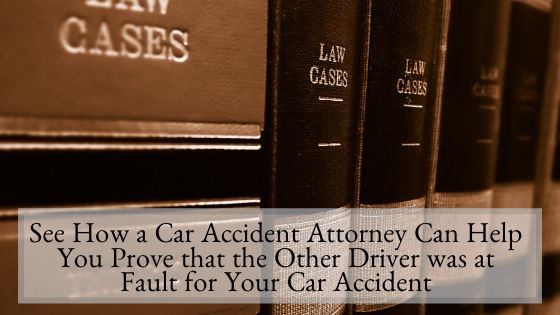Although physically and mentally recovering from injuries after an auto accident should be your priority, establishing fault is essential to getting the compensation you need to recover fully. Understanding the different methods each entity uses to determine responsibility can help you, and your Texas car accident attorney can focus on the details to build a strong case. Here’s what you should know about how to establish fault after a car accident.

Texas Police Apply the Traffic Laws
After a crash, the police are often the first to arrive on the scene. The police will begin their investigation of who is at fault. However, their inquiry is focused much differently from that of the insurance company and the courts. The police don’t think about whether anyone involved can bring a claim against anyone else for their damages. Instead, the police look to see if anyone committed a crime or violated a traffic law.
The police start by looking at state traffic laws. Many different traffic laws regulate everything from speed to right of way to vehicle maintenance. There may also be local traffic ordinances that apply.
Law enforcement determines if any driver violated a traffic law. They might decide that one party violated a traffic ordinance, that both sides violated an ordinance or that neither party violated an ordinance. If they believe that someone broke a traffic law, they may issue a ticket. If someone committed a crime, they may issue a citation or make an arrest.
To conduct their investigation, law enforcement talks to the people involved. They talk to witnesses and look at the physical damage. They may look for skid marks on the road to use context clues to determine how the incident happened, and who was at fault.
After their investigation, the police will complete a crash report. Although the report contains helpful information about the officer’s investigation, ultimately, the report is only the officer’s opinion. The report also doesn’t definitively answer the question of whether either party acted negligently.
There’s no “negligence” box for a police officer to check on a crash report. Instead, the people involved in the accident and their attorneys use the police report as a starting point for proving fault to the insurance company and the courts.
How the Insurance Companies Determine Fault
When the insurance company conducts their investigation, they look at a lot of the same evidence that the police consider. They’ll want to hear your version of the story, and they’ll ask you for any type of proof you may have such as photographs. The insurance company may even go more in-depth than the police by looking at things like your medical records.
The insurance company isn’t exactly looking for whether you or anyone else violated a traffic law. Whether someone broke the law is certainly a reliable indicator of fault, but what the insurance company wants to know is whether either party acted negligently.
That means, the insurance company wants to know if anyone involved failed to use the amount of care and caution that a reasonable person should have applied in the same situation. A reasonable person isn’t necessarily perfect, but they’re careful and considerate of others. If a party acts negligently, that negligence must be a contributing factor to the crash for the person to be considered at fault for the accident.
Proportionate Responsibility
As far as the insurance company and the courts are concerned, fault isn’t always a yes or no question. When more than one party contributes to the crash, it’s called proportionate responsibility. This means that if you are found partially at fault for the injury, then your damages can be reduced. The court compares your negligence to the other people involved.
Even if you’re partially to blame, you can still recover for some of your losses. The insurance company and the courts reduce your compensation by the amount that you’re to blame. That is, if you’re 20 percent to blame, you are unable to recover for 20 percent of your damages. If you’re 50 percent or more to blame, you won’t be able to recover at all.
Retain the Services of a Texas Car Accident Attorney
If you’re in a Texas auto accident, having an attorney on board as soon as possible can help you prove fault whether the police, the insurance company or the court is looking at your case. Helping law enforcement make an accurate determination of responsibility is the first step to successfully collecting fair compensation from the insurance company or bringing your case to court.
An experienced car accident attorney can help you understand how each different entity determines fault. They also help you build your case with these considerations in mind to ensure you are able to collect the compensation you will need to make a full recovery and get on with your life.
Call our law offices today at any of our convenient locations and get a free consultation.
Arlington (817) 522-4451
Dallas (972) 362-6848
Fort Worth (817) 764-1375
Plano (972) 354-4602
Cedar Hill (972) 338-9427
McKinney (469) 522-3688
Lewisville (972) 354-4605
Frisco (972) 725-7681
Grapevine (817) 835-8677
Irving (972) 354-4610
Keller (817) 204-0904
Garland (214) 572-2251
Denton (940) 222-4060
Addison (972) 564-8108
You can also contact us online by using our quick contact form.










